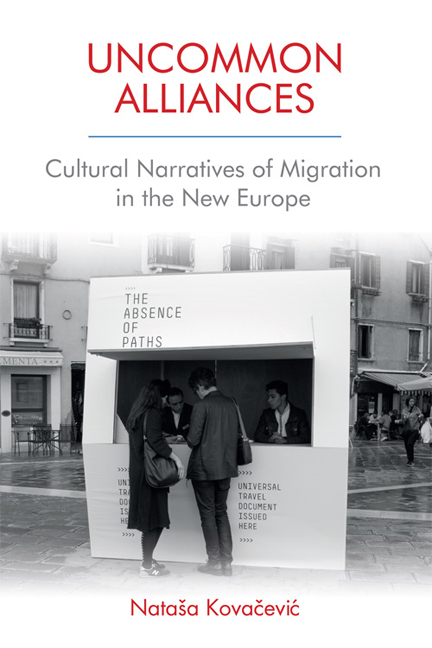Book contents
- Frontmatter
- Contents
- Acknowledgements
- Dedication
- Introduction
- 1 Performing the State: Artistic Re-Presentations of European Community
- 2 Alternative Hospitalities on the Margins of Europe
- 3 Colonial Spectres in Europe’s Historiography
- 4 Postcolonial and Postcommunist Contact Zones in a United Europe
- 5 Epilogue: Memories of Yugoslavia and Europe to Come
- Notes
- Bibliography
- Index
4 - Postcolonial and Postcommunist Contact Zones in a United Europe
Published online by Cambridge University Press: 01 May 2021
- Frontmatter
- Contents
- Acknowledgements
- Dedication
- Introduction
- 1 Performing the State: Artistic Re-Presentations of European Community
- 2 Alternative Hospitalities on the Margins of Europe
- 3 Colonial Spectres in Europe’s Historiography
- 4 Postcolonial and Postcommunist Contact Zones in a United Europe
- 5 Epilogue: Memories of Yugoslavia and Europe to Come
- Notes
- Bibliography
- Index
Summary
In the introduction I argue that, to understand the European Union's invisible borders and hierarchies of belonging, we should bring into conversation the differentially excluded experiences of postcolonial and postcommunist populations. This chapter explores the possible points of convergence where such conversations might happen in the context of existing and emerging literary texts that take on (post) Cold War Europe's attitude to its legacy of communism and experience of decolonisation. Following EU expansion into formerly communist countries, new economic migrants from the East have entered contact zones with established migrant populations from Europe's former colonies, facing similar prejudice and fear-mongering discourses about invasion to which postcolonial migrants have been subjected, often including a racialised component. These contact zones have become the preoccupation of numerous contemporary literary and film narratives, but as British writer of Ghanaian background Mike Phillips observes of his novel A Shadow of Myself (2000), his decision to write about both Eastern Europe and decolonising Africa was met with surprise ‘because as a black writer, I was expected to limit myself to thinking about the former colonies’ (2010: 47). While contemporary literature and film, with increasing enthusiasm, irreverently crosses the borders between ‘ethnically’ and ‘geographically’ restricted topics, postcolonial and postcommunist studies maintain separate objects of inquiry. Or, rather, as Hana Cervinkova notes, ‘students of postsocialism look to postcolonialism for inspiration, but postcolonial scholarship does not seem to be too interested in what studies of postsocialism have to contribute’ (2012: 159).
Postcolonial studies have traditionally neglected the postcommunist part of the world, in part because many of these countries have not been considered colonies in the true sense of the word. However, many would argue that the EU has established a protocolonial relationship to its Eastern periphery by exploiting its more affordable labour and natural resources and by unilaterally setting the terms for economic development along neo-liberal lines without the possibility of negotiation. It is therefore unsurprising that post-Cold War transitions to capitalism have been contemporaneous with an unprecedented flourishing of theoretical inquiries into the type of coercive, colonial-type mechanisms and assumptions that accompanied these, often seismic, social shifts.
- Type
- Chapter
- Information
- Uncommon AlliancesCultural Narratives of Migration in the New Europe, pp. 158 - 205Publisher: Edinburgh University PressPrint publication year: 2018



